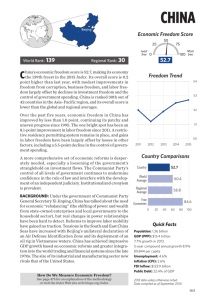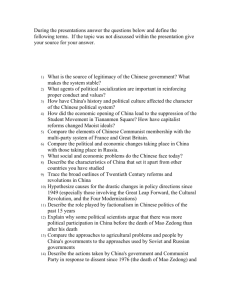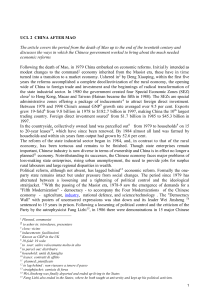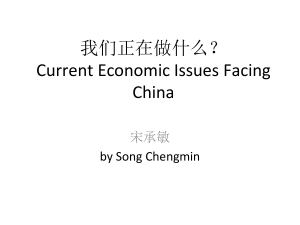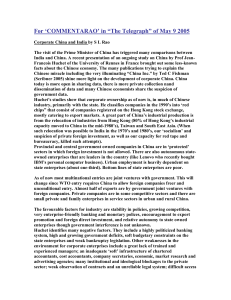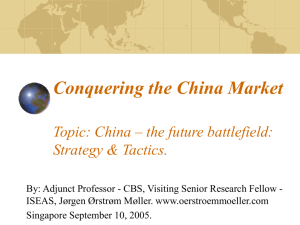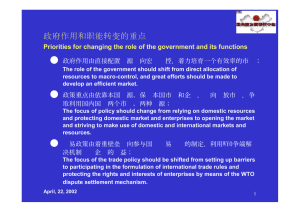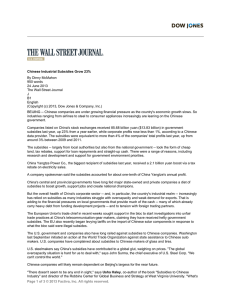CHINA While there is no denying that a stronger China has much to
advertisement
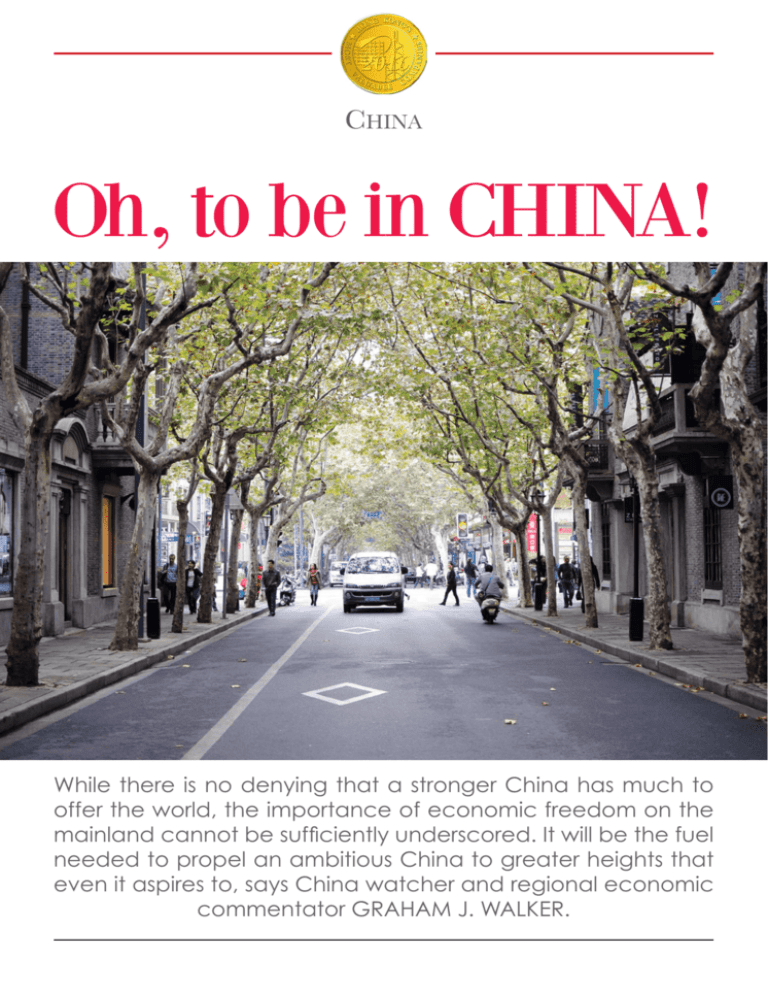
CHINA Oh, to be in CHINA! While there is no denying that a stronger China has much to offer the world, the importance of economic freedom on the mainland cannot be sufficiently underscored. It will be the fuel needed to propel an ambitious China to greater heights that even it aspires to, says China watcher and regional economic commentator GRAHAM J. WALKER. nder the government of General Secretary Xi Jin ping, China has addressed the need for economic “rebalancing” (the shifting of power and wealth from state-owned enterprises and local governments to the household sector), however real changes in power relationships have been hard to see. Steps have been taken in this direction, but the effect has yet to be seen at grassroots. Still, it must be said that China has achieved impressive GDP growth based on economic reforms and greater integration into the world trading and financial systems since the late 1970s. The size of its industrial and manufacturing sector now rivals that of the United States. Modest Growth Xi Jinping – Steering China Along New Roads CHINA has achieved impressive GDP growth based on economic reforms and greater integration into the world trading and financial systems since the late 1970s. The size of its industrial and manufacturing sector now rivals that of the United States. Xi Jinping began his first year in power with an admirable anti-corruption campaign that spotlighted several high-ranking government and private sector officials, but corruption remains. With Chinese cyber adventures visibly on the rise in 2014, protection of intellectual property rights has suffered a set back. China’s weak(er) judicial system remains vulnerable to political influence and the giant urban migrant workforce could well do with a little more protection from the promised reform. According to global think-tank Heritage Foundation, China’s economic freedom score is 52.7, making its economy the 139th freest in the 2015 Index. Its overall score is 0.2 point higher than last year, with modest improvements in freedom from corruption, business freedom, and labor freedom largely offset by declines in investment freedom and the control of government spending. China is ranked 30th out of 42 countries in the Asia–Pacific region, and its overall score is lower than the global and regional averages. Its report makes the point that over the past five years, economic freedom in China has improved by less than 1.0 point, continuing its patchy and uneven progress since 1995. The one bright spot has been an 8.1-point improvement in labor freedom since 2011. A restrictive residency permitting system remains in place, and gains in labor freedom have been largely offset by losses in other factors, including a 5.5-point decline in the control of government spending. Need of the Hour A more comprehensive set of economic reforms is desperately needed, especially a loosening of the government’s stranglehold on investment flows, the report suggests. China’s top individual income tax rate is 45 percent, and its top corporate tax rate is 25 percent. Other taxes include a value-added tax and a real estate tax. The total tax burden equaled 19.4 percent of gross domestic product in the most recent year. Total government expenditures account for 24.8 percent of domestic output, and public debt equals 22 percent of GDP. Regulatory reform has progressed gradually and unevenly. Incorporating a business takes 11 procedures and about a month. Bureaucratic hurdles still add to the cost of completing licensing requirements. Labor regulations are relatively flexible, but enforcement of labor laws is not consistent. The government provides large fossil fuel and electricity subsidies and also funds significant agricultural subsidies. China’s average tariff rate is 4.1 percent. Export taxes, subsidies to stateowned enterprises, anti-dumping barriers, and other measures restrict trade. The government screens foreign investment and still tightly controls the financial system. State-owned enterprises benefit from greater access to capital and lower financing costs, but small and medium-sized companies continue to suffer from the lack of access to credit. Days Ahead That China knows how to march ahead economically and wants to, is certain. The issue is relinquishing control before having systems in place to troubleshoot. Meanwhile, growth of the global social media machinery is changing the way people live and work in China. IF CHINA can deal effectively and fast with its pollution issues, it will have taken a leap toward that eventual day when China will be seen as a solid friend in need to every country that has its interest at heart. Consumers on the mainland, spurred on my their Hong Kong cousins are demanding luxuries earlier deemed unreachable. The world’s biggest brand names are still awaiting their turn to step on Chinese soil, regardless. Sooner than later, commerce will prevail, many feel. So will free thinking. Consumerism will prevail over the political ‘won’t and this will bode well for a China that wants to grow rapidly and beyond expectations. That transparency will benefit China more than cronyism ‘will’ is obvious. The problem China has is untangling itself from the web that it has unwittingly woven for itself. The will if the inspired majority will always prevail as history has shown. In China though, we will see this happen with all the suave and sophistication as we saw during the protests in Hong Kong. The Chinese have redefined decency and gentlemanliness for the world to see so, economic change will come to China faster that it thinks and it will come with grace. Why do I feel so certain? It seems, the world will agree that the Chinese spirit of enterprise is a juggernaut – an example of will and vision prevailing over all. That ideology of progress, that lust for improvisation, the hunger for achievement is producing a growing, unstoppable force. If China can deal effectively and fast with its pollution issues, it will have taken a leap toward that eventual day when China will be seen as a solid friend in need to every country that has its interest at heart.
